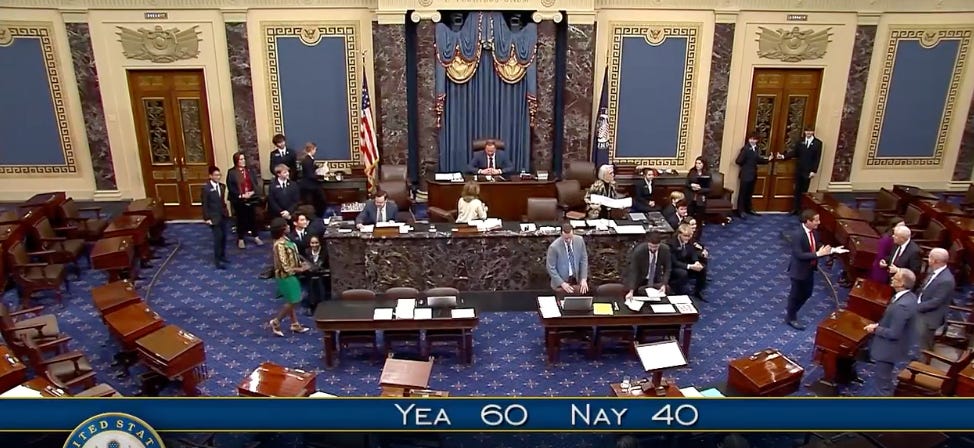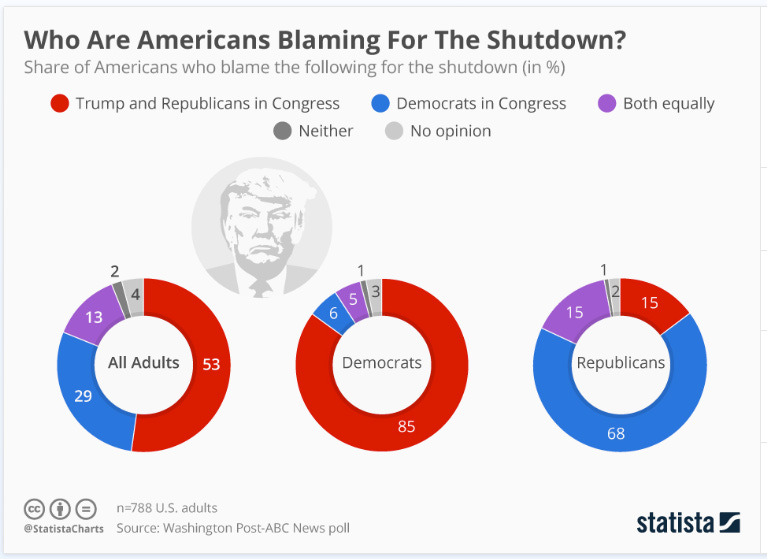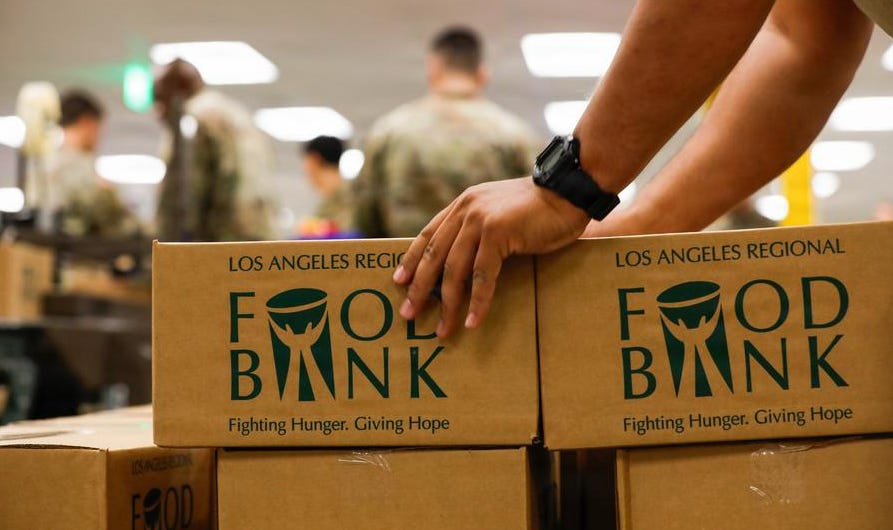(Dobbs) It Was A Problem With No Perfect Solution
Speaker Mike Johnson: “I’m not promising anybody anything.”
The eight senators who joined with the Republicans to end the government shutdown did the right thing. In the short term.
Millions of Americans already were agonizing over where tomorrow’s meal would come from. Millions more wondered whether flights they took, those lucky ones whose flights weren’t cancelled, were safe. And about a million-and-a-half federal workers, whether furloughed or forced to work without a paycheck, were beginning to make painful choices between a rent payment or a car payment or a medicine that makes the difference between good health and sickness. Some, who live paycheck to paycheck, already had received eviction notices from their landlords.
So yes, in the short term, it was right of those eight senators to accept a Republican compromise to end the shutdown and help these people. They did win promises to hire back all the furloughed federal workers and, despite the president’s threats not to, to give back pay to all who’ve gone up to six weeks without it. And as essential as anything, SNAP payments for food, critical to tens of millions of households— again, despite the president’s heartless efforts not to pay them out— will start up again. Although the eight senators ditched their demand to extend subsidies for Obamacare, they saw their capitulation to the Republicans as the lesser of two evils.
But maybe it wasn’t. Maybe, in the long term, it was the greater of two evils.
Two reasons.
First, there is no guarantee that in exchange for those eight senators’ votes, Republicans will live up to their word to hold separate votes on Obamacare subsidies by the middle of December to afford tens of millions of Americans the chance that their health insurance will not cost three or four times what it costs today, which would mean many no longer could afford it at all. It is not paranoid to note, since Obamacare first passed, Republicans consistently have tried to kill it. In fact House Speaker Mike Johnson wouldn’t even commit to such a debate in the House, coldly announcing, “I’m not promising anybody anything.”
That’s why House Democratic leader Hakeem Jeffries called the whole deal “a promise, a wing and a prayer.”
Second, Democrats have been on a roll. Donald Trump’s approval ratings have been sinking. Democrats swept last week’s elections in a tide of anti-Trump sentiment. And polls show that a plurality of Americans blame Republicans for the government shutdown, not Democrats.
Now, politically, they might be throwing that away. Their short-lived unity has disappeared. A letter-writer said in The New York Times, “(voting) with Republicans to end the shutdown…. was not compromise. It was collapse.” By joining Republicans to reopen the government, they have made it look like most of the Democrats didn’t want to. They have made their party look weak. And, as columnist Ezra Klein wrote, “Democrats have just taught Trump that they will fold under pressure. That’s the kind of lesson he remembers.”
In short, they have given some of the edge they finally won back to Trump and the Republicans. This nation can’t afford that, unless you want power concentrated in the hands of MAGA Republicans for time immemorial. That would be the greater of two evils.
I realize, it’s easy for me to say that in the bigger picture, these senators should not have made this deal. The shutdown hasn’t touched me personally at all. I am lucky enough to have the resources to pay my bills. I don’t depend on SNAP payments to put a meal on the table. I haven’t tried to fly anywhere since the shutdown started and haven’t planned any trips to see a national park. My Medicare stayed intact and my social security payments were never interrupted.
I also realize that the tens of millions of Americans who have been touched one way or another by the shutdown— and for many it’s more like “slammed” than just “touched”— don’t have the luxury of cheering on the Democrats to hold out for longer rather than capitulate. Dan Rather wrote, “The president’s willingness to inflict pain was greater than their willingness to see their constituents struggle.”
But strictly from a political point of view without considering the human side of the equation, most people are like me: their lives haven’t changed because of the shutdown. Which means, since polls show that most Americans support Obamacare and the subsidies that come with it, they would be willing to let the nation weather the storm for long enough to see the Republicans finally fold. All the while fighting to find alternatives to help citizens who are suffering. Of course for Democrats, that was the purpose of the exercise in the first place.
For every Democrat, deciding whether to end the shutdown has been a very difficult call. I won’t say that there was no right or no wrong because every senator and each of us has an opinion about what’s right and what’s wrong. But it was a problem with no perfect solution.
I put it on a par with last week’s redistricting election in California, where voters chose to allow gerrymandering to create more Democratic congressional districts, for the purely political purpose of countering Republican-led states like Texas that have done the same. California law had required that district lines only be drawn by an independent commission. The election changed that. It perverted the purity of California’s system, but if the Democrats didn’t do this, they were giving up ground to the Republicans for years, maybe decades, to create overwhelming and unbeatable majorities in the United States Congress.
By my lights, as hard as it is to say, giving in to the Republicans was the wrong decision. As Ezra Klein put it, “A group of Senate Democrats broke ranks and negotiated a deal to end the shutdown in return for — if we’re being honest — very little.” But the balancing argument is, they did get one thing in return: relief for Americans who suffer from the shutdown. However, that’s only good in the short term.
I don’t condemn the eight senators. The fact that none is up for reelection next year supports the suspicion that they really did what they did with the best of intentions. I just wish, for the long term good of the nation, they’d gone the other way.
Over more than five decades Greg Dobbs has been a correspondent for two television networks including ABC News, a political columnist for The Denver Post and syndicated columnist for Scripps newspapers, a moderator on Rocky Mountain PBS, and author of two books, including one about the life of a foreign correspondent called “Life in the Wrong Lane.” He also co-authored a book about the seminal year for baby boomers, called “1969: Are You Still Listening?” He has covered presidencies, politics, and the U.S. space program at home, and wars, natural disasters, and other crises around the globe, from Afghanistan to South Africa, from Iran to Egypt, from the Soviet Union to Saudi Arabia, from Nicaragua to Namibia, from Vietnam to Venezuela, from Libya to Liberia, from Panama to Poland. Dobbs has won three Emmys, the Distinguished Service Award from the Society of Professional Journalists, and as a 39-year resident of Colorado, a place in the Denver Press Club Hall of Fame.
You can learn more at GregDobbs.net




Definitely a tough decision. I have very mixed feelings about it.
Thanks as always for a thoughtful column. I think the Democrats made the best of a bad situation, since they were never going to get full concessions from the uncaring and insensitive Republicans, who were only to happy to continue screwing millions of essential American workers and the food insecure to make political points. I live in Oklahoma where my two Republican senators spend their days posting divisive rhetoric and parroting Trump lies, while doing nothing to address the real concerns and opinions of most of their constituency. While I hardly trust the GOP Senate, House and particularly Trump to live up to their “commitment” to a vote, when they don’t allow a real debate and a vote, or when they do and then vote against keeping healthcare more affordable, maybe it’ll be ammunition for the midterms and a small start to turning the ship around.